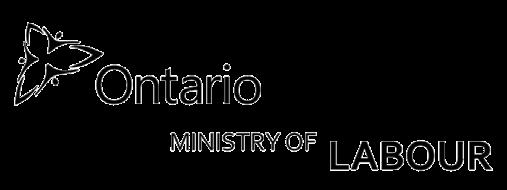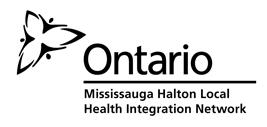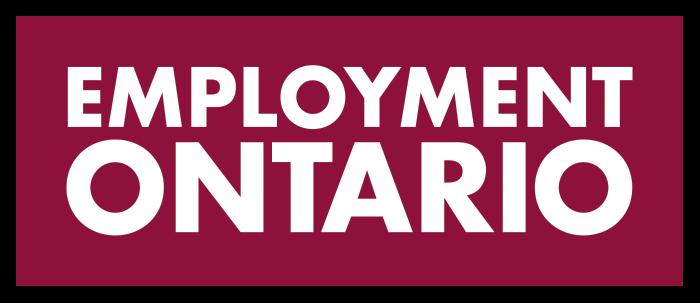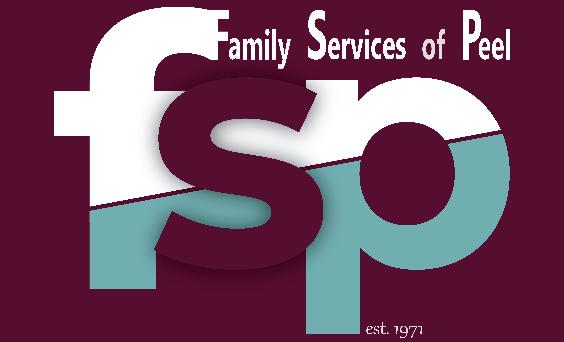
Volume 17; Issue 1; February 2025





Volume 17; Issue 1; February 2025



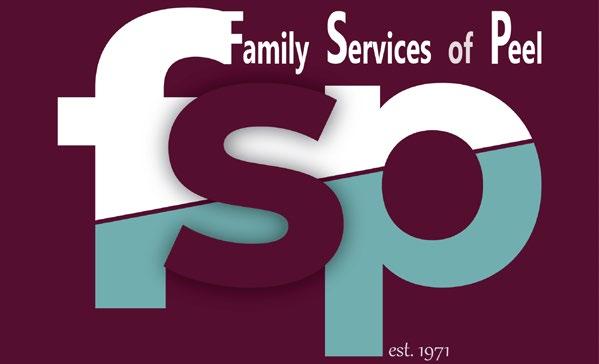


As we begin 2025, I am grateful for the unwavering support of our community, partners, Board, and dedicated staff. Your commitment and collaboration continue to be the driving force behind Family Services of Peel’s work. Together, we are shaping a thriving, inclusive, and family-friendly community in the Region of Peel. This issue of our newsletter highlights the breadth of our work and the shared vision that unites us one that prioritizes innovation, equity, and meaningful impact. Over the past quarter, we have taken significant strides in advancing our mission, strengthening our foundations, and engaging our community in transformative ways.
Key Milestones & Landmark Work - We have undertaken several strategic initiatives to guide the future direction of both Family Services of Peel (FSP) and the Peel Institute on Research & Training (PIRT), such as an Environmental Scan – a comprehensive analysis to enhance service improvements and community engagement; a Retrospective Study – a deep dive into past programs and policies to inform future strategies. A manuscript on the History of PIRT, a historical overview of PIRT, documenting its impact and evolution for publication; an updated PIRT Policies & Procedures Manual to ensure our policies reflect best practices and drive meaningful change. For Community Engagement & Events - our Community Consultation Day on February 6, 2025, was successful as the community voices engaged with optimism and support. Their insights will be pivotal in guiding our strategic plan and services to families. We are hosting our first International Women's Day Gala on March 8 and would love you to join us as we celebrate women’s resilience, leadership, and achievements. To continue Strengthening Our Foundations, we have the upcoming official launch of FSP Commons, a dedicated space to foster community engagement and support programs like Kitchen Harmonyempowering clients with developmental disabilities
and Social Tables for Seniors to reduce isolation and strengthen connections. The implementation of Sage Intacct will enhance efficiency, transparency, and accountability in financial management and support our long-term sustainability. As for Enhancing Internal Processes, we are strengthening our evaluation framework and implementing a Team Charter and Code of Conduct to foster team collaboration, accountability, and excellence in service delivery.
Our contributions to research and policy discussions continue to reinforce our role as leaders in evidence-based practice and advocacy. Our Recent and Upcoming Publications explore women’s attitudes toward intimate partner violence, the impact of racial microaggressions on Black youth, and family needs frameworks for newcomer immigrants and refugees. These works reflect our commitment to addressing critical social issues and informing meaningful change.
Looking ahead, we remain focused on innovation, research-driven solutions, and communitycentered approaches to service delivery. As we embark on this new year, we are excited to build on these achievements, deepen our impact, and create lasting change. Thank you for your continued support in making Peel a safer, more inclusive, and thriving community. We look forward to staying connected with you and sharing more updates in the months ahead.
Warm regards,

Sandra Rupnarain Executive Director, Family Services of Peel

Family Services of Peel (FSP) is thrilled to announce the launch of the FSP Commons, an innovative community space designed to host a variety of programs and activities that promote connection, learning, and well-being. Located in the heart of Peel Region, the FSP Commons is a testament to our commitment to fostering a vibrant and inclusive community.
The inaugural program at the FSP Commons is the highly anticipated Kitchen Harmony project. This dual-purpose initiative serves as both a community kitchen and a hub for skills development. It invites seniors to volunteer, fostering intergenerational connections while providing participants with hands-on learning opportunities in food preparation, nutrition, and teamwork. Kitchen Harmony is the first of many programs that will bring this space to life.
Looking ahead, the FSP Commons is poised to become a versatile venue for a variety of initiatives. Programs like the Seniors Social Tables, Families Connected, and Active Parenting will find a welcoming home here. In addition, workshops and information sessions related to Employment Services will leverage this space to support job seekers in the community.
Beyond FSP’s own programs, the Commons will also be available to partner agencies and community members in need of a space for their events and activities. Whether it's hosting training sessions, support groups, or cultural events, the Commons will provide an accessible and inclusive environment for diverse community needs.
The launch of the FSP Commons marks a significant step forward in our mission to build stronger, more connected communities. It reflects our vision of collaboration and inclusivity, offering a platform where individuals and organizations can come together to share resources and achieve common goals.
We invite you to join us in celebrating this milestone. Together, we can maximize the potential of the FSP Commons and create lasting positive impacts for everyone in Peel Region. Stay tuned for updates on upcoming programs and opportunities to get involved.

The 2024 statistics for Family Services of Peel’s Counselling Services Program showcase the organization’s dedication to addressing community needs through diverse initiatives.
The Counselling Program (CP) itself served almost 4,000 clients from January to December, with the highest monthly intake in July. This indicates a strong community demand, particularly in the summer months, when client numbers peaked.
The Partner Assault Response (PAR) Program saw steady participation in April and continued group completions. This program also tackled barriers faced by clients, with significant elective reports in May and June. Additionally, the outreach efforts to partners faced challenges, as no new partners were contacted from August onwards, suggesting a potential area for renewed focus.
The Diverse Seniors Wellness Program (formerly SAS) maintained consistent engagement. The Violence Against Women (VAW) Program provided critical support, where April saw the highest intake and the peak in direct support hours.
These results reflect Family Services of Peel’s impactful services and identify areas for growth, ensuring the programs continue to meet the community’s evolving needs.
The Developmental Services Program at Family Services of Peel has demonstrated its continued commitment to supporting clients through its two core services: Adult Protective Services (APS) and Supported Independent Living (SIL). The 2024 statistics showcase both the breadth and depth of the program's impact across the year.
In 2024, the number of new or unique clients served varied significantly, with the highest intake seen in April and December. Direct and indirect service hours played a crucial role in meeting client needs. Direct service hours peaked in May while indirect service hours were highest in October. These variations highlight the program’s adaptability in responding to fluctuating client demands throughout the year.
SIL maintained a steady client base, serving an average of 35 clients monthly. Direct hours were most concentrated in April, while indirect hours saw a significant peak in June. The sustained level of service demonstrates SIL's dedication to providing comprehensive support to individuals striving for independence.
Overall, the Developmental Services Program has successfully managed its resources to address the evolving needs of the community. With its continued focus on individualized care and consistent service delivery, the program remains a vital lifeline for those requiring developmental support.

The Employment Services Program at Family Services of Peel has made significant strides throughout 2024, assisting diverse communities in achieving their employment goals. By December, the program recorded over 400 Minimum Assisted Clients Program Starts.
The program effectively caters to a wide range of needs through its streams. Notably, Stream C remains the most active. Stream A and Stream B also contributed. Clients with disabilities have shown a strong presence, especially in November, a dramatic rise compared to earlier months.
Workshops and information sessions have been pivotal, with nine sessions conducted in November alone, attracting 125 participants. Efforts to connect with businesses have also expanded, peaking in May with 125 contacts. Language-specific services highlight the program’s inclusivity. Volunteer involvement, while minimal earlier in the year, gained momentum in the second half, contributing valuable hours to support program activities.
Family Services of Peel remains committed to empowering clients through personalized services, bridging gaps, and creating pathways to sustainable employment opportunities. The program continues to strengthen its reach and impact, driving positive change within the community.
Family Services of Peel celebrated the holiday season with its annual Holiday Lunch in December 2024, bringing together staff, the Board, volunteers, and community partners for a joyful gathering. The event featured a delicious meal, festive decorations, and an atmosphere of warmth and appreciation. It was a wonderful opportunity to reflect on the year’s achievements, strengthen connections, and recognize the dedication of everyone who contributed to the organization’s mission. Laughter, gratitude, and holiday cheer filled the room, making it a memorable celebration to close the year.



FSP Board of Directors at the Annual Holiday Lunch (December 2024)
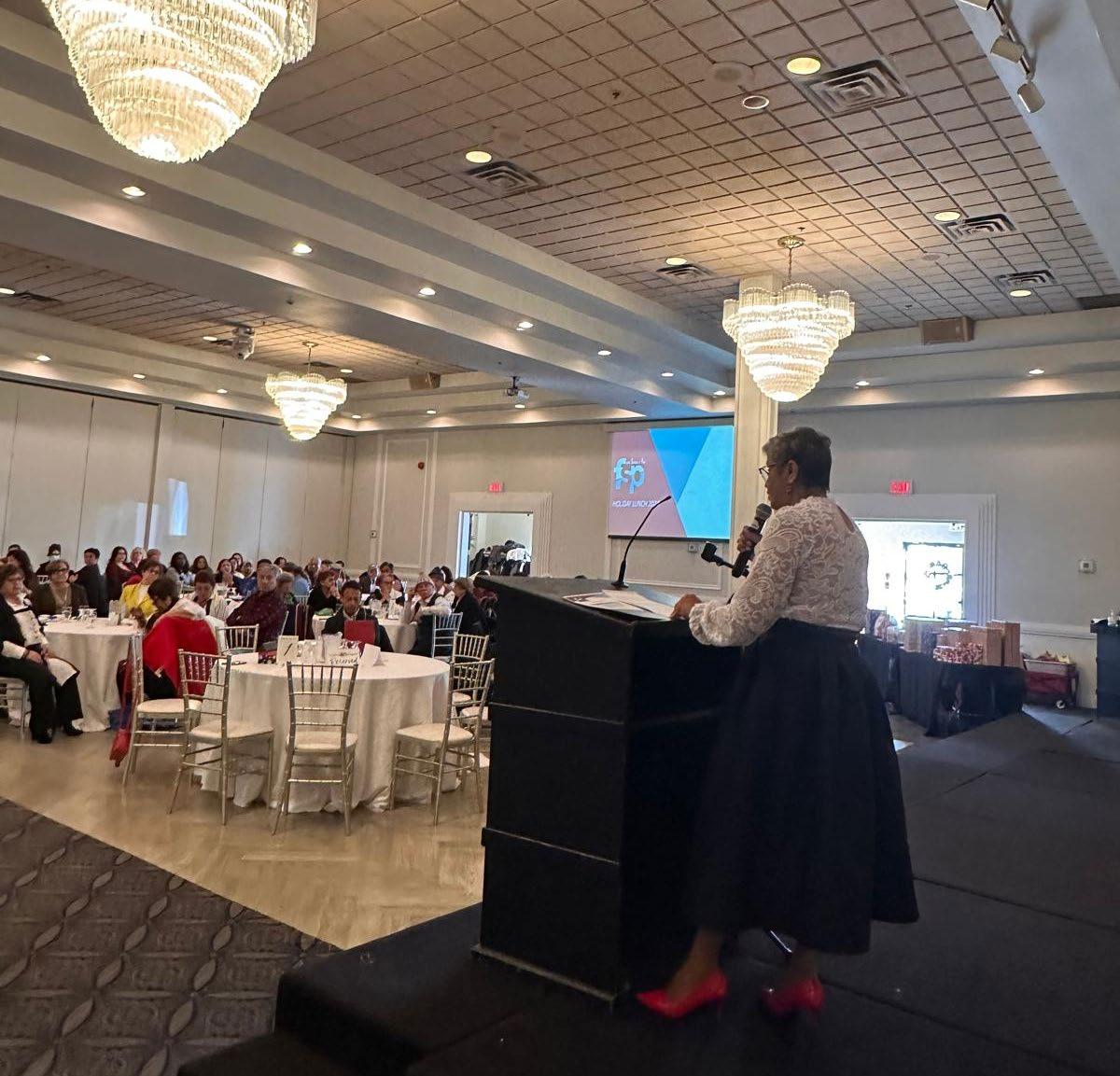



Senior Social Table Groups at the Annual Holiday Lunch (December 2024)
Spanish, Chinese, and Caribbean

The Peel Institute of Research and Training (PIRT) achieved significant milestones in 2024, reflecting its commitment to advancing equity and social well-being in the Peel Region.
• Environmental Scan: Comprehensive research was conducted to guide Family Services of Peel’s (FSP) strategic plan for the next decade, addressing critical trends in employment, health, and social services.
• Retrospective Study: Insights from PIRT's history were documented in a manuscript slated for publication in 2025, highlighting its transformative work.
• Policy Enhancements: The PIRT Policies and Procedures Manual was thoroughly updated to align with its framework and organizational goals.
• Tamarack Project: The outcomes of an earlier initiative for newcomer immigrants were disseminated, with key manuscripts accepted for publication and ongoing discussions to expand the model's reach.
PIRT collaborated with FSP to submit 13 funding proposals, securing five grants. Notable awarded projects include:
• B3 Black Community Fund: Focused on anti-Black racism advocacy and family frameworks.
• OTF Seed Grant: Engaging racialized youth to strengthen community belonging and develop governance boards.
• New Horizons for Seniors: Expanding senior programs to Arab and Filipino communities, including community cooking and skills training.
• MCCSS Francophone Outreach: Developed outreach plans and translated essential resources for Francophone families.
PIRT’s projects emphasized participatory action research and knowledge mobilization.
• 2SLGBTQIA+ Service Mapping: Identified gaps in services and training for providers, fostering inclusivity in social work practices.
• Disability Studies: Comprehensive literature reviews were conducted to support employers in creating inclusive workplaces, particularly in skilled trades.
• University Health Network Collaboration: Addressed care gaps for individuals with developmental disabilities and sickle cell disorder.
With a clear mandate to address systemic inequities through evidence-based approaches, PIRT’s 2024 accomplishments underscore its pivotal role in fostering an inclusive and equitable society.
Family Services of Peel is thrilled to announce two exciting fundraising events that bring the community together for fun, celebration, and support of vital programs. Mark your calendars and join us as we work towards creating a positive impact in Peel Region.
Starting January 30, 2025, Family Services of Peel hosted weekly Bingo nights at Rama Gaming House in Mississauga. This event promises an evening of entertainment and camaraderie. Whether you're a seasoned Bingo player or a first-timer, this is a great opportunity to enjoy yourself while supporting a good cause. Proceeds from Bingo nights will go directly toward funding critical services such as counseling, youth programs, and senior support initiatives. Bring your friends and family, and let the fun begin!
On March 8, 2025, we invite you to celebrate International Women’s Day at the Mississauga Grand Banquet & Event Centre. This elegant gala will honor the achievements of women in our community and highlight the importance of gender equality. Expect an evening filled with inspiring speakers, a delectable dinner, live entertainment, and a silent auction. The gala provides an opportunity to dress up, celebrate, and contribute to empowering women in Peel Region.
Tickets and further details are available on our website. Don’t miss these fantastic opportunities to give back while having a great time!

Both events offer unique ways to engage with the community and support Family Services of Peel’s mission. By participating, you’ll help sustain programs that promote mental health, family well-being, and inclusion.

On February 6, 2025, Family Services of Peel (FSP), in partnership with community leaders from government, businesses, service providers, and those with lived experience, successfully hosted the Community Consultation Day. The event brought together passionate voices to explore how we can make Peel one of the best places for families in Canada.
Key speeches from community figures like Marsha Forbes, Principal of Folkstone Public School and Liz Martinez, a service user from the LGBTQ+ community, set the stage for deeper conversations. These speeches highlighted the critical need for collaboration in addressing issues like poverty, education, employment assistance, and the potential for positive change within the region.
MP Iqwinder Gaheer also attended the event and praised Family Services of Peel for its vital role in supporting newcomers and the community. He highlighted Peel’s rapid growth and MississaugaMalton’s economic significance. Sharing his own immigrant experience, he emphasized the challenges newcomers face and the importance of accessible services.
MP Gaheer also addressed key concerns like rising grocery costs, community safety, and mental health. He outlined government efforts, including school meal programs, crime prevention strategies, and increased healthcare funding. He stressed the need to break cultural stigmas around mental health and reaffirmed his commitment to improving public safety and community well-being.
The Community Consultation Day was facilitated by Paul Born, co-founder of the Tamarack Institute and a dedicated champion for community well-being. The event was a powerful space for learning, dialogue, and action planning. Attendees engaged in meaningful discussions about the historical and evolving nature of families in Peel, identified critical gaps, and co-created strategies to build a more inclusive and supportive community for all families.
"We are thrilled by the level of engagement and commitment shown by our community leaders," said Sandra Rupnarain Executive Director at Family Services of Peel. "This gathering was just the beginning. The insights and ideas shared today will serve as the foundation for developing strategic and action plans aimed at creating real, lasting impact for families in Peel." Heartfelt thanks to all of you who made it a successful day.
A key highlight of the day was the multi-sector roundtables, where diverse voices collaborated to identify shared opportunities and solutions. The event reinforced the power of collective action in shaping a stronger, more resilient community.
Family Services of Peel extends its gratitude to all participants for their dedication to this vision. As we move forward, we remain committed to fostering partnerships that prioritize prosperity, equity, and well-being for all families in our region.
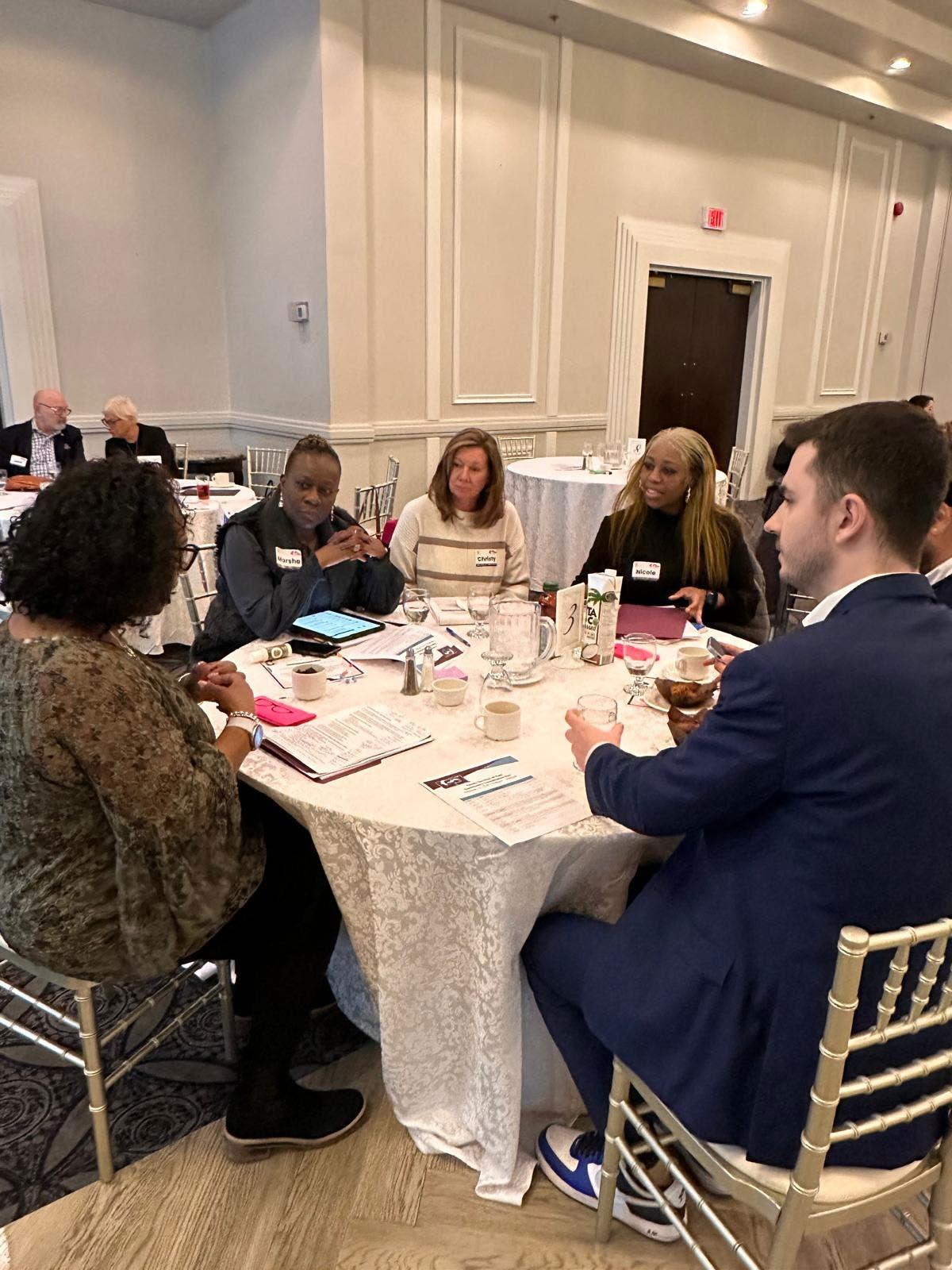

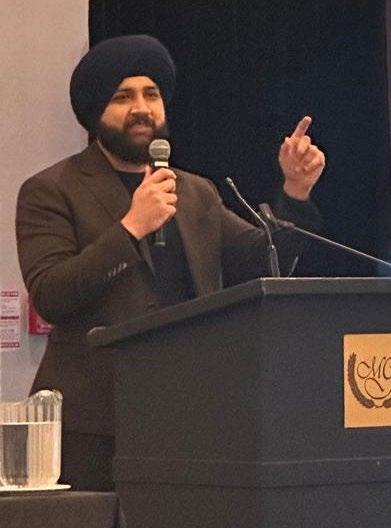
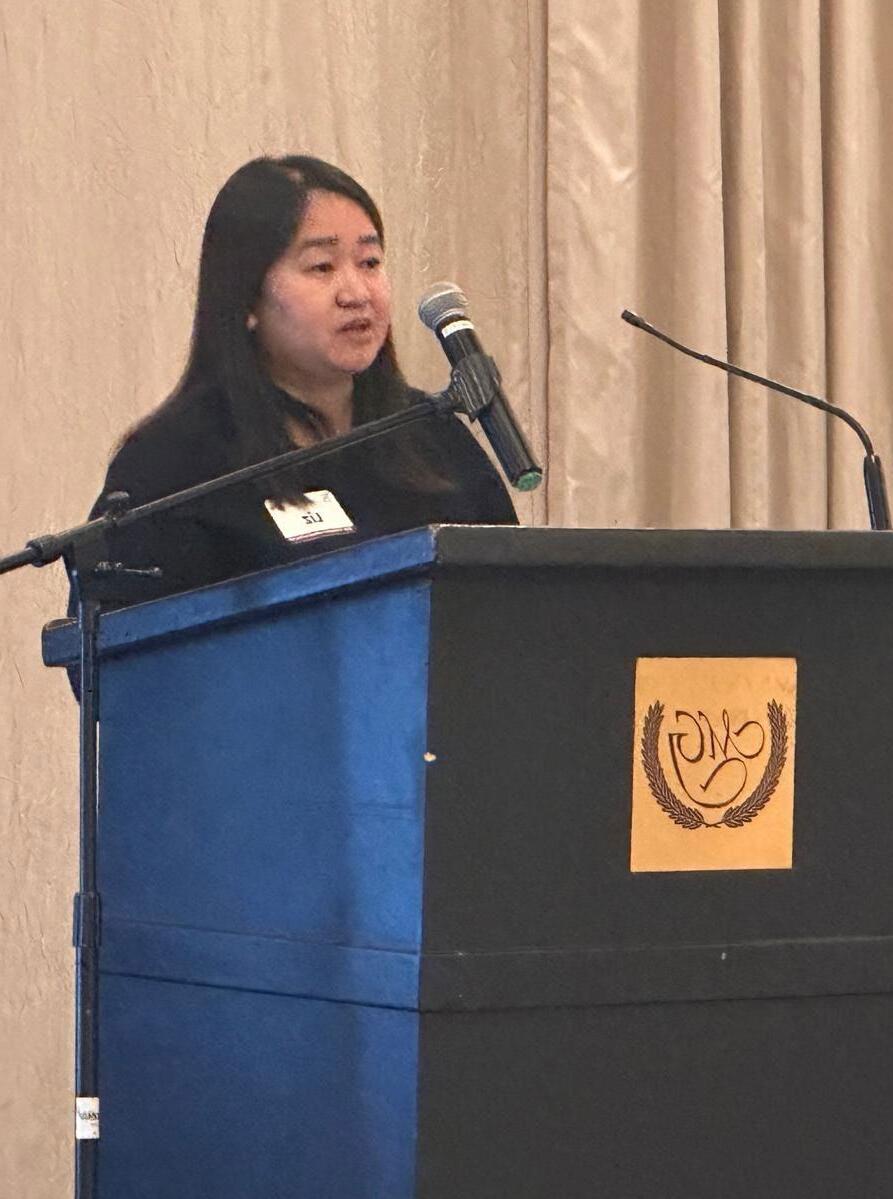


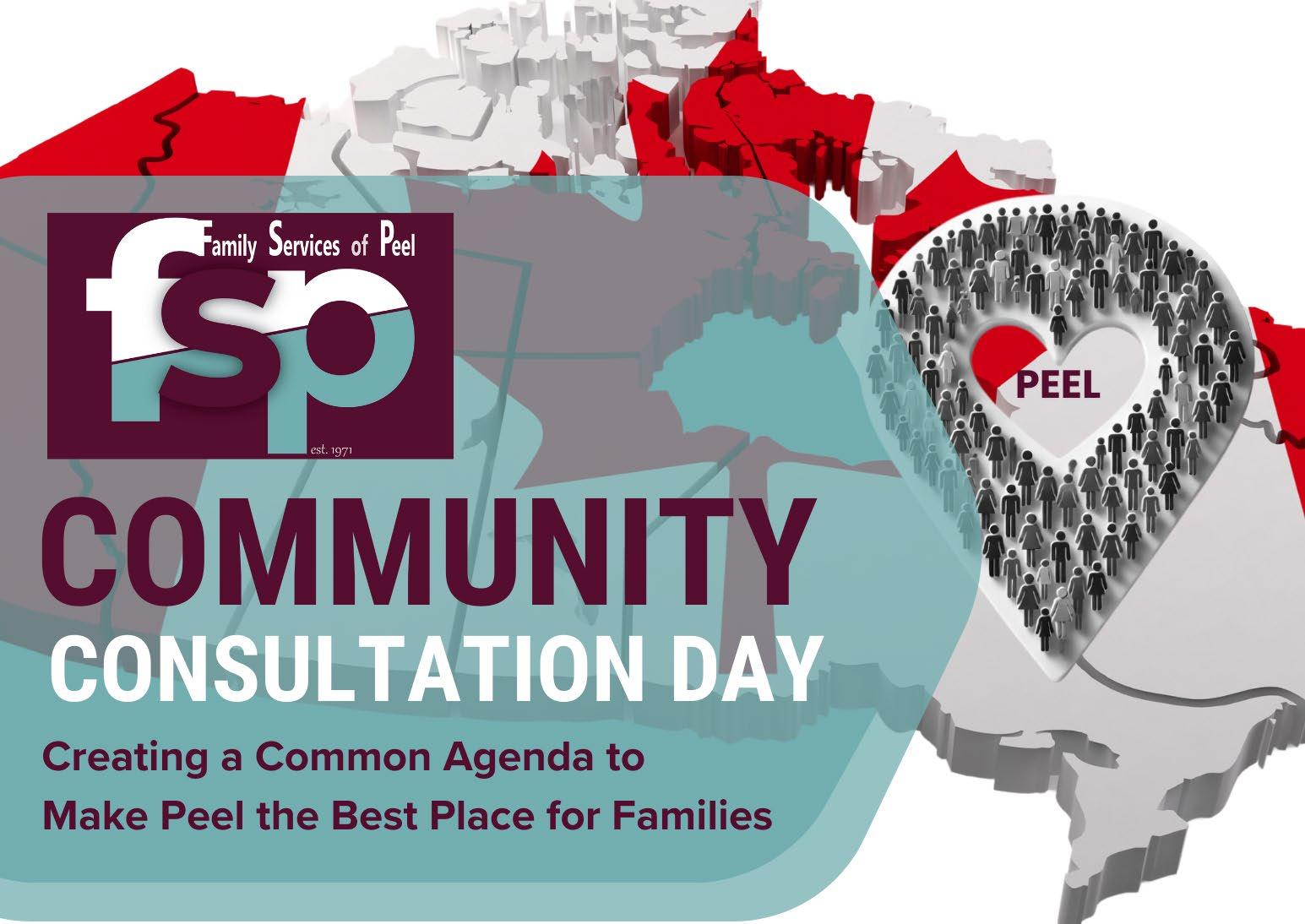
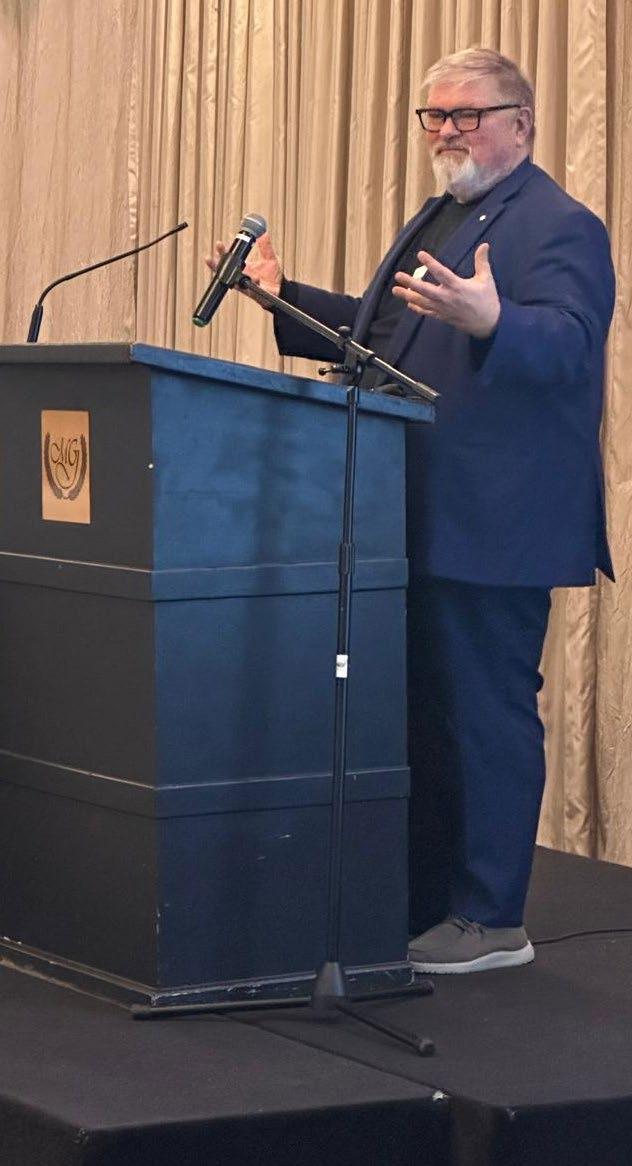


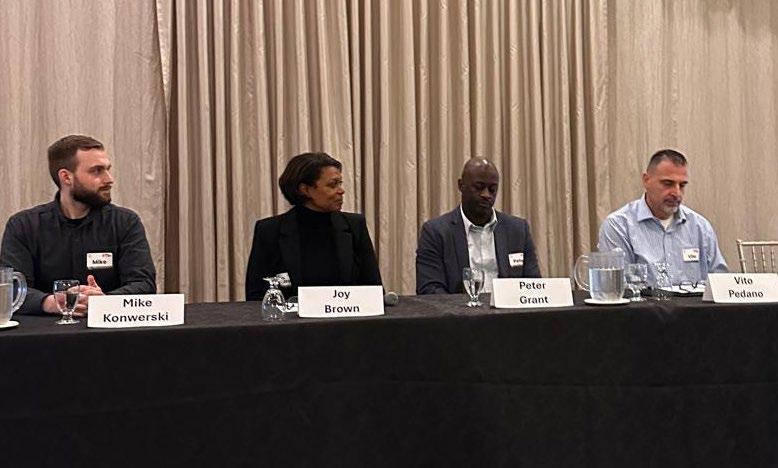

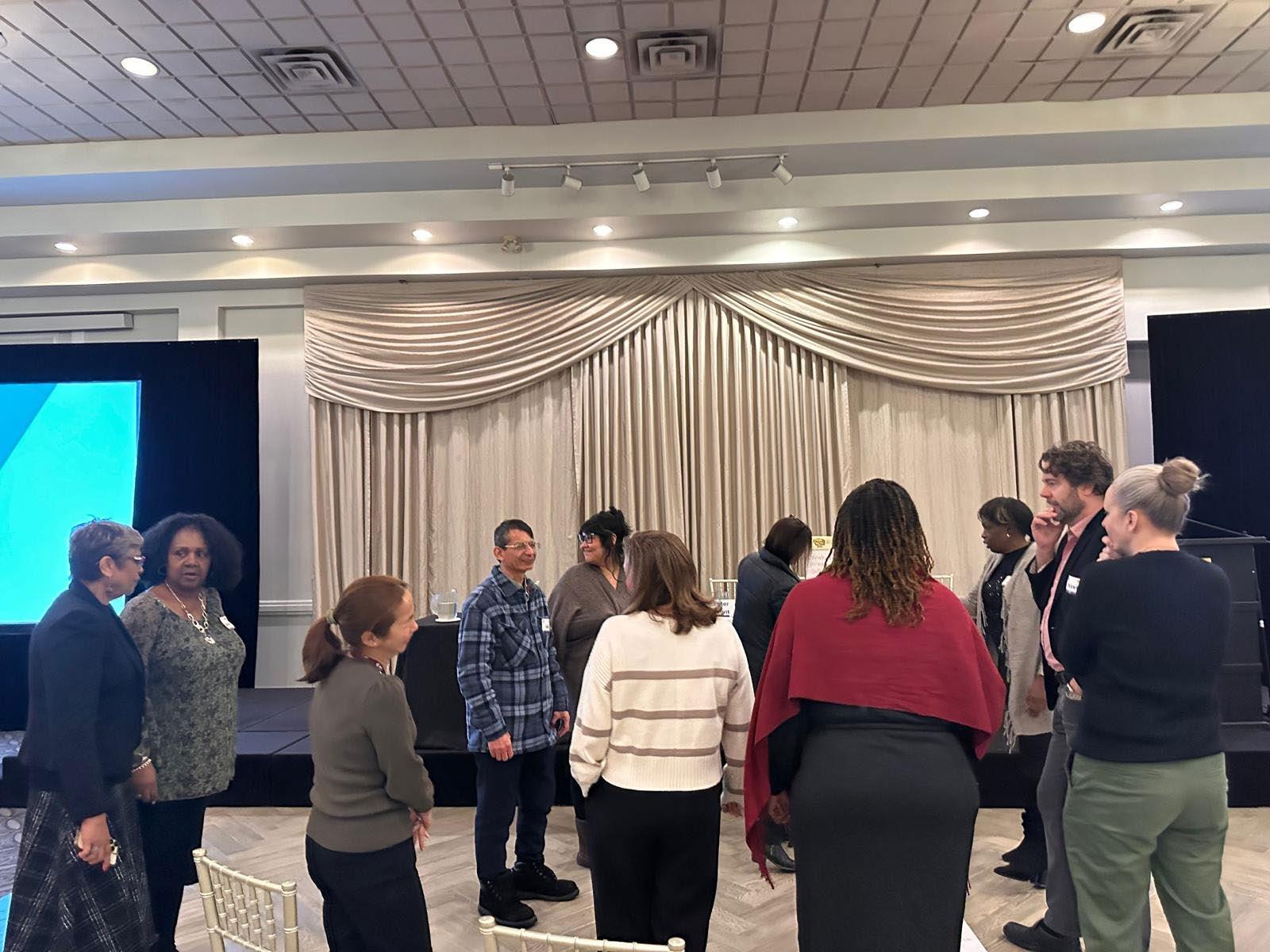
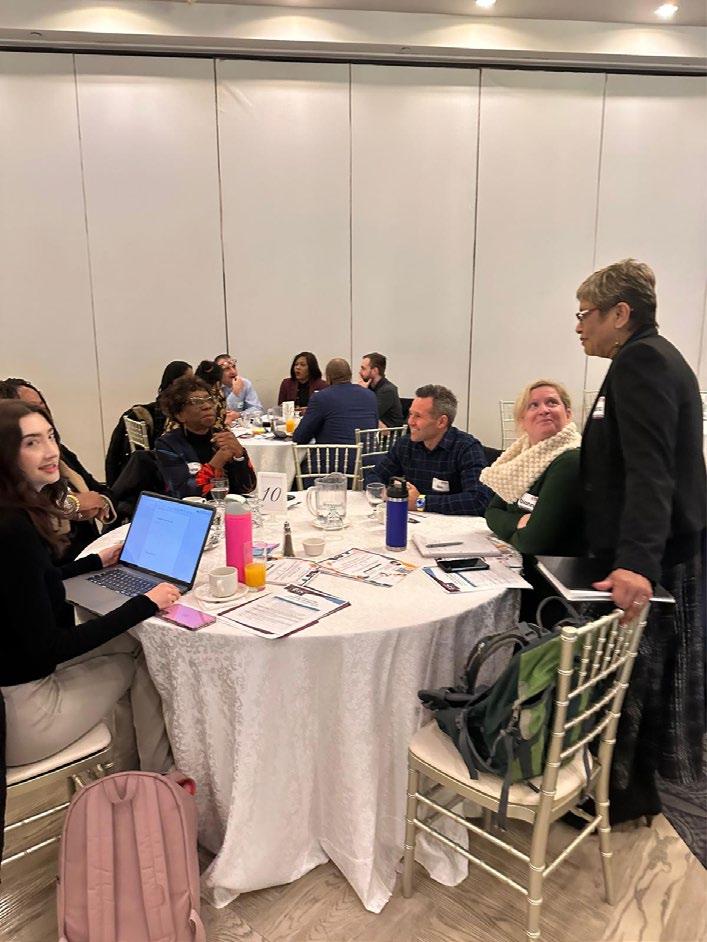

As we look ahead to 2025, the goal of making Peel Region the best place for families to thrive remains both a challenge and an opportunity. With its vibrant diversity and growing population, Peel is uniquely positioned to lead as a family-centered community through strategic investments, inclusive policies, and community engagement.
A thriving family begins with access to essential resources. Expanding affordable housing options, accessible childcare, and quality healthcare will help alleviate some of the financial pressures faced by families. Enhanced mental health and wellness programs, tailored to meet the needs of children, youth, parents, and seniors, are critical to fostering resilience and emotional well-being.
Education is another cornerstone of success. Strengthening partnerships between schools, community organizations, and local businesses can help create pathways to lifelong learning and career readiness. Programs promoting digital literacy, mentorship, and extracurricular activities will ensure that children and youth have the tools they need to excel in a rapidly evolving world. Additionally, financial literacy programs and employment training for parents can enhance economic stability, ensuring families have the skills and resources to build a secure future.
Equity and inclusion must remain at the forefront. Peel’s strength lies in its cultural richness and creating spaces where all families feel welcomed and valued is essential. This includes offering multilingual services, celebrating diverse traditions, and addressing systemic barriers that impact marginalized communities. Advocating for policy changes that promote equal opportunities, and social justice will further ensure that every family, regardless of background, has a fair chance at success.
Investing in community infrastructure is equally important. Expanding safe parks, recreational facilities, and accessible transportation will encourage families to connect, play, and explore. Initiatives like community kitchens, social tables, and family-friendly events foster a sense of belonging while addressing practical needs. Strengthening support networks through volunteer programs and intergenerational activities can also promote social cohesion and mutual aid.
Ultimately, achieving this vision requires a collaborative approach. Governments, businesses, and residents must work hand-in-hand to prioritize the needs of families. Through continuous engagement, innovation, and shared responsibility, we can make Peel a place where families not only live but thrive building a foundation for a vibrant, prosperous, and inclusive future.


Ensuring the safety of families is a cornerstone of a thriving community. In the Region of Peel, where families of diverse backgrounds and circumstances call home, creating a safe environment requires collaborative efforts and a commitment to proactive solutions.
Family safety encompasses physical, emotional, and social well-being. In Peel, local authorities, community organizations, and residents work together to address the factors that impact safety. The Peel Regional Police play a key role in maintaining public safety through initiatives such as school resource programs, community policing, and public awareness campaigns on topics like cyber safety and bullying.
However, safety begins at home. Families are encouraged to foster open communication, set boundaries, and create environments where every member feels secure and valued. Resources like parenting workshops, conflict resolution programs, and mental health support, offered by organizations such as Family Services of Peel, help strengthen families and address underlying stressors that can lead to unsafe situations.
Community safety is equally important. Ensuring that neighborhoods are well-lit, pedestrian-friendly, and inclusive helps reduce crime and fosters a sense of belonging. Programs targeting domestic violence, elder abuse, and child neglect provide crucial interventions for vulnerable individuals. Peel Region has also made strides in supporting survivors through shelters, counseling services, and advocacy programs.
Yet, challenges remain. Issues such as intimate partner violence, substance abuse, and financial insecurity continue to threaten family safety. Addressing these requires a coordinated approach, including investments in affordable housing, accessible mental health care, and education on healthy relationships.
Family safety is a shared responsibility. By building awareness, offering support, and fostering collaboration, we can ensure that Peel is a region where families feel secure in their homes, communities, and lives. Together, we can create a safe and nurturing environment for all.
The well-being of children is a vital indicator of a community’s overall health and future. In the Region of Peel, home to one of Canada’s most diverse populations, there are both promising advancements and ongoing challenges when it comes to ensuring the safety, health, and development of our youngest residents.
According to recent studies, the Region of Peel boasts a high level of cultural and linguistic diversity, offering children the opportunity to grow up in an environment enriched by multicultural experiences. Schools across the region emphasize inclusivity and innovation, equipping children with skills to thrive in an increasingly globalized world. Furthermore, access to recreational spaces and community programs provides opportunities for physical activity and social engagement, essential components of a child’s holistic development.
However, challenges persist. Many families face economic pressures, with 13% of children in Peel living in low-income households. Access to affordable childcare, nutritious food, and healthcare remains a concern for vulnerable populations. Mental health is another pressing issue, with rising rates of anxiety, depression, and other concerns among children and youth. The pandemic has exacerbated these challenges, disrupting education, social interactions, and family dynamics.
Additionally, systemic barriers such as language difficulties, discrimination, and unequal access to resources disproportionately affect newcomer families, hindering children’s ability to fully participate in community life.
Family Services of Peel is committed to addressing these gaps through programs that support mental health, parenting, and access to essential resources. By fostering partnerships with schools, healthcare providers, and local governments, we aim to create a safety net that ensures every child has the opportunity to thrive.
It is our shared responsibility to advocate for policies and initiatives that prioritize children’s well-being. Together, we can create a brighter, healthier future for all children in the Peel Region.


The Region of Peel – Mississauga, Brampton, and Caledon – is a dynamic and diverse community filled with opportunities for families to thrive. As we continue to grow, our collective goal is to ensure that every family in Peel feels supported, connected, and empowered. Building a familyfriendly city requires a shared commitment from all sectors government, businesses, community organizations, and residents to create spaces and initiatives that foster inclusion, safety, and well-being.
A family-friendly city starts with accessible infrastructure. This means ensuring that parks, recreational facilities, and community centers are well-maintained, inclusive, and equipped to meet the needs of children, parents, and seniors. Streets must be safe for pedestrians and cyclists, with robust public transportation options connecting neighborhoods.


Programs and services also play a vital role. Expanding affordable childcare, enhancing access to healthcare, and supporting education initiatives are critical steps in creating a supportive environment for families. At Family Services of Peel, we are proud to contribute through our diverse programs, including mental health support, parenting workshops, and employment assistance, helping families build resilience and navigate life’s challenges.
Equally important is cultivating a sense of belonging. Initiatives such as cultural events, inclusive playgrounds, and mentorship programs promote community connections and celebrate Peel’s rich diversity. Ensuring that families from all backgrounds feel welcomed and valued strengthens the social fabric of our region.
Your voice matters. By participating in local events, volunteering, or sharing ideas, you can help shape Peel into a city that prioritizes families. Together, we can create a region where children can flourish, parents feel supported, and seniors are cherished making Peel a true family-friendly destination. Let us continue to work together to turn this vision into reality, fostering a region that future generations can proudly call home.


Source: https://budget.peelregion.ca/2025/
The Region of Peel has unveiled its 2025 budget, emphasizing investments that align with its 20-year vision. The budget allocates $3.9 billion for operating expenditures and $2.3 billion for capital expenditures, totaling $6.2 billion.
A significant portion of the operating budget, $1.6 billion, is dedicated to enhancing community services. This includes funding for early years and childcare, housing support, income support, and services for seniors. These investments aim to improve residents' quality of life, particularly for vulnerable populations.
Capital expenditures of $2.1 billion are earmarked for developing integrated, safe, and complete communities. Projects include advancements in public health infrastructure, transportation networks, waste management systems, and water and wastewater services. These developments are designed to accommodate the region's growing and aging population, which is increasing by over 25,000 people annually.
The budget also allocates $200 million in operating and $50 million in capital expenditures to ensure government operations are future-oriented and accountable. This funding will support business services, information technology, and real property asset management, enhancing the efficiency and transparency of regional governance.
As the Region of Peel continues to experience rapid growth, this budget reflects a commitment to sustaining current service levels while addressing the increased demands of a diverse and expanding population. Residents can anticipate improvements in essential services and infrastructure, contributing to a higher standard of living across the community.

In most provinces of Canada, the third Monday in February is observed as Family Day. Celebrating Family Day is an opportunity to prioritize relationships, strengthen family bonds, and create lasting memories. Here are several reasons why it’s worth celebrating:
Life can be busy, and Family Day provides a dedicated time to connect with loved ones. Spending quality time together builds stronger relationships and reinforces a sense of belonging.
The holiday emphasizes the importance of balancing work responsibilities with personal life, encouraging people to pause and invest in their family and well-being.
Special days dedicated to family often lead to unique experiences and cherished memories. Whether it’s a family outing or a cozy day at home, these moments are invaluable.


Family Day encourages not only bonding within households but also participation in community events, which can strengthen neighborhood connections and shared values.
It serves as a reminder of the importance of family in providing support, guidance, and love throughout life.
In the middle of winter, Family Day offers a much-needed opportunity for fun, relaxation, and rejuvenation, boosting spirits during a typically cold and dreary season.
Celebrating Family Day is about acknowledging the people who matter most and nurturing those relationships. How do you think families can make the most of this holiday?
February is traditionally associated with Valentine’s Day, but it’s also an opportunity to celebrate all forms of love beyond the romantic. Love for family, friends, community, and self are equally important in creating a fulfilling life.
Family love provides a foundation of support and stability. Consider planning a family game night, preparing a meal together, or simply spending quality time sharing stories. These activities strengthen bonds and create cherished memories.
Friendship is another vital connection that deserves recognition. Send a heartfelt message to a close friend or organize a small gathering to celebrate your bond. Simple acts of appreciation can go a long way in nurturing lifelong friendships.
Community love reminds us of the importance of giving back. Volunteering, donating to a cause, or simply offering a helping hand to a neighbor can create a ripple effect of kindness. This February, look for ways to contribute to the wellbeing of those around you.
Lastly, self-love is fundamental. Take time for self-care by engaging in activities that bring you joy and relaxation. Reflect on your achievements, set personal goals, and treat yourself with the same kindness you extend to others.
Celebrating love in its many forms enriches our lives and fosters a sense of connection. This February, let’s expand our understanding of love and embrace all the meaningful relationships that bring warmth and joy to our hearts.


As I sit down, numb, frustrated, and helpless for being unable to find a window and identify traces of my lingua-cultural identity after migrating to Canada, I discover a metaphoric keyhole that allows me to look at the blurry past and find reasons for this emptiness. I am not too sure if a language researcher is permitted vulnerability about his own linguistic identity, but I want to do this for two personally important reasons. Firstly, these internal reflections empower me to make sense of the chaos I often find myself trapped in, and secondly, it gives me hope to give this out to the space and the community that will respect, guard, and protect this vulnerability.
The world has trumpeted South Asia as the mother of many languages. It is not uncommon for many South Asians to speak more than two languages with high proficiency. What's underneath is not always a very plain or simple story. Aspiring to claim and acquire multiple languages is not freely or easily granted to all in my cultural context. Your caste, gender, religion, socio-economic status, and ethnicity will enable or disable you in the process of becoming multilingual and multicultural. Especially if you are born in a working-class, orthodox Muslim family where your mother and father do not share a common religion or a language.
Patriarchy and orthodox religious ideologies could play critical roles in shaping your identity. When I uncovered this truth, I felt extremely furious for having failed to inquire why my mother was not allowed to teach us Kannada (a classical Dravidian language) that she brought to us as a part of her cultural heritage. It was much later when I learned that my paternal family erased Kannada from our consciousness because Urdu part of the Indo-Aryan language, believed to be native to many Muslims in South Asia had to be the hegemonic language for us.
Unfortunately, I cannot speak either of these languages because, according to a few in my family, Kannada could have corrupted my Muslim identity by creating diversions to lean toward my mother’s religion, and Urdu is seen as a Muslim-only language and is currently facing systemic erasure back home.
I frequently discover that I am in a unique position at this moment, and my experiences of migration help me view the past through a different lens while I am working to make sense of it in order to feel integrated and to achieve a sense of belongingness in Canada.

Between 2022 and 2023, PIRT and UTM collaborated to carry out a communitybased research project, Building Equitable Economies for Immigrants and Refugees in Peel. This one-year, mixedmethods project focused on the family as the unit of analysis to develop a Family Needs Framework and to propose an integrated Service Pathway that would improve services for and enhance the wellbeing of immigrant and refugee families in Peel. Our findings highlighted the urgent need to address
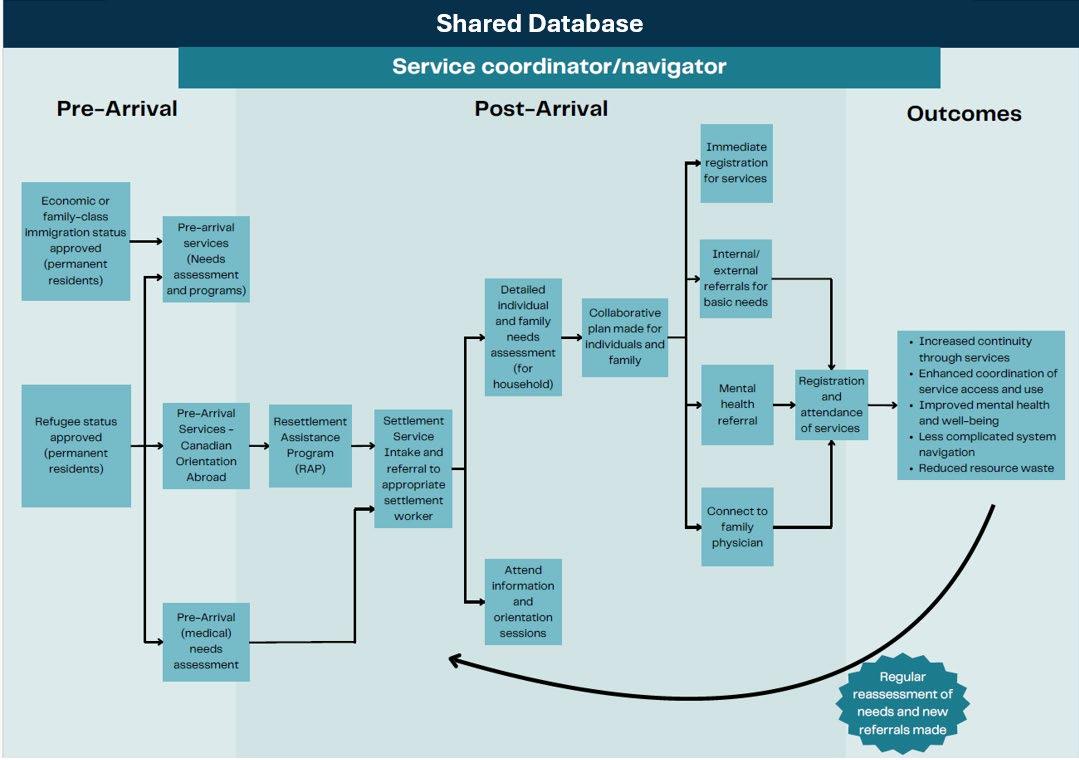
fragmented service pathways, advocate for enhanced coordination between service sectors, and address the holistic migration and resettlement needs of immigrant and refugee families
Drawing on these findings, we co-designed an integrated Service Pathway framework aiming to improve access to and coordination of services for newcomers. Built upon a family-centred approach that integrates mental health, social, and settlement services, the proposed service pathway has five critical components that will support positive outcomes for families and agencies: (i) a wide-ranging database for record keeping and enhanced coordination; (ii) a systems navigator; (iii) pre-arrival service mobilization; (iv) post-arrival services coordination; and (v) a referral loop. The Service Pathway shifts from an individual-focused approach to a family-centred approach, recognizing the interconnectedness of individuals within their family systems, and the influence of community, social networks, and societal or structural factors on their wellbeing across their migration and settlement journey.
Ultimately, by optimizing this pathway, we hope to create a unified system that best addresses the needs of newcomer families in the region and that enhances social and mental health equity and improves social and mental health outcomes.

In Canada, National Indigenous Languages Day is observed annually on March 31. It also aligns with broader efforts, such as UNESCO’s International Decade of Indigenous Languages (2022–2032).
It is a day dedicated to recognizing, celebrating, and promoting the preservation and revitalization of Indigenous languages. It highlights the cultural, historical, and spiritual significance of these languages and raises awareness of the challenges they face due to colonization, marginalization, and loss of fluent speakers. The purpose is to celebrate the rich linguistic diversity of Indigenous peoples, raises public consciousness about the importance of protecting and revitalizing endangered Indigenous languages, and for advocacy to support language preservation and education.
Languages are deeply tied to Indigenous identities, traditions, and worldviews. They carry traditional knowledge, oral histories, and ecological wisdom that benefit all of humanity. Revitalizing languages is part of the journey toward addressing the harms of colonization and assimilation policies, such as residential schools.
Many Indigenous languages are endangered, with some on the brink of extinction. So, how can we celebrate Indigenous languages?
1. Community Events: Host language workshops, storytelling sessions, or cultural performances.
2. Education: Learn words or phrases in an Indigenous language spoken in your area.
3. Support Initiatives: Donate to or advocate for organizations working to revitalize Indigenous languages.
4. Social Media Campaigns: Share information about the significance of Indigenous languages and their preservation.
Celebrating National Indigenous Languages Day fosters respect for the linguistic heritage of Indigenous peoples and underscores the shared responsibility to preserve these invaluable cultural treasures. Let’s start together by learning a few basic phrases.
It’s important to note that there are various dialects too:
Anishinaabemowin (Ojibwe)
• Boozhoo – Hello
• Miigwech – Thank you
• Aaniin – How are you?
Mohawk (Kanien'kéha)
• Sekon – Hello
• Nia:wen – Thank you
• Onen – Goodbye
• Satennotons – Be careful
There have been significant shifts in how Black History Month is observed and perceived over time. These changes reflect evolving societal attitudes, increased awareness of systemic racism, and a broader understanding of Black contributions to history, culture, and progress.
Expanded Focus Beyond History
• From a Historical Lens to Contemporary Issues: Initially centered on recognizing historical achievements of Black figures, Black History Month now also addresses ongoing social justice issues like systemic racism, police brutality, and economic inequality.
• Celebrating Present-Day Achievements: Modern observances highlight the contributions of current leaders, innovators, and changemakers in the Black community.
Intersectionality and Inclusivity
• Black History Month increasingly recognizes the diversity within the Black experience, including the roles of Black women, LGBTQ+ individuals, and those from various cultural and geographical backgrounds (e.g., African, Caribbean, Afro-Latinx heritage).
Global Perspectives
• Observances have expanded beyond the United States and Canada, with growing acknowledgment of Black history and contributions in Europe, South America, and other regions.
Increased Corporate and Institutional Engagement
• Companies, schools, and other institutions now play a larger role in recognizing Black History Month, with educational initiatives, community outreach, and commitments to diversity and inclusion.
• Critics, however, caution against "performative activism," urging organizations to demonstrate meaningful, year-round commitment to racial equity.
Digital and Social Media Amplification
• Social media platforms have transformed how Black History Month is celebrated, offering tools for education, advocacy, and storytelling.
• Viral campaigns and hashtags like #BlackLivesMatter and #BlackExcellence amplify voices, making Black history and culture more accessible globally.
Year-Round Advocacy
• There’s a growing push to ensure that Black history is not confined to a single month but is integrated into broader historical and cultural narratives year-round.
Some have questioned the effectiveness of Black History Month in combating systemic issues, advocating for deeper institutional changes rather than symbolic observances.
The shifts reflect a broader cultural movement toward a more inclusive, equitable, and comprehensive understanding of Black history and its relevance to modern society. How do you see the future of Black History Month evolving?

a big thank you to our Funders




